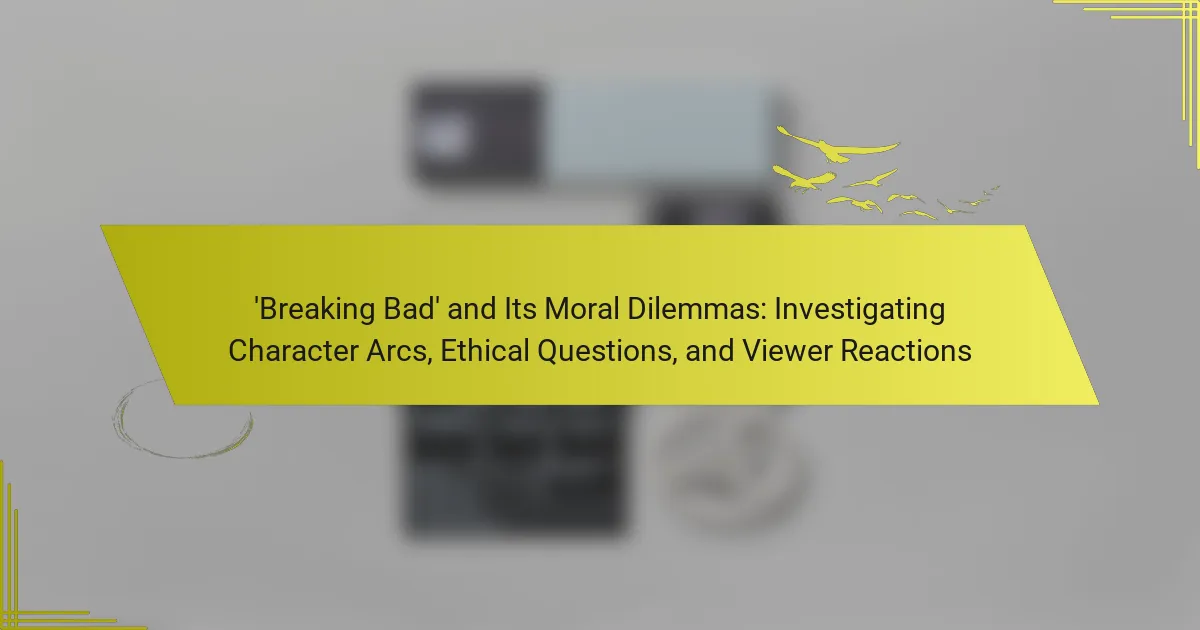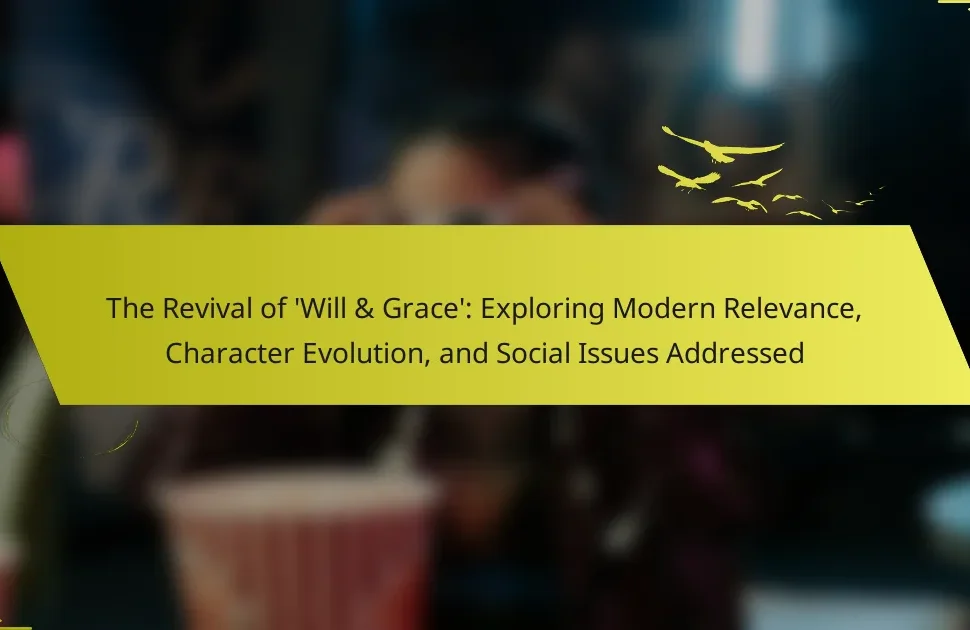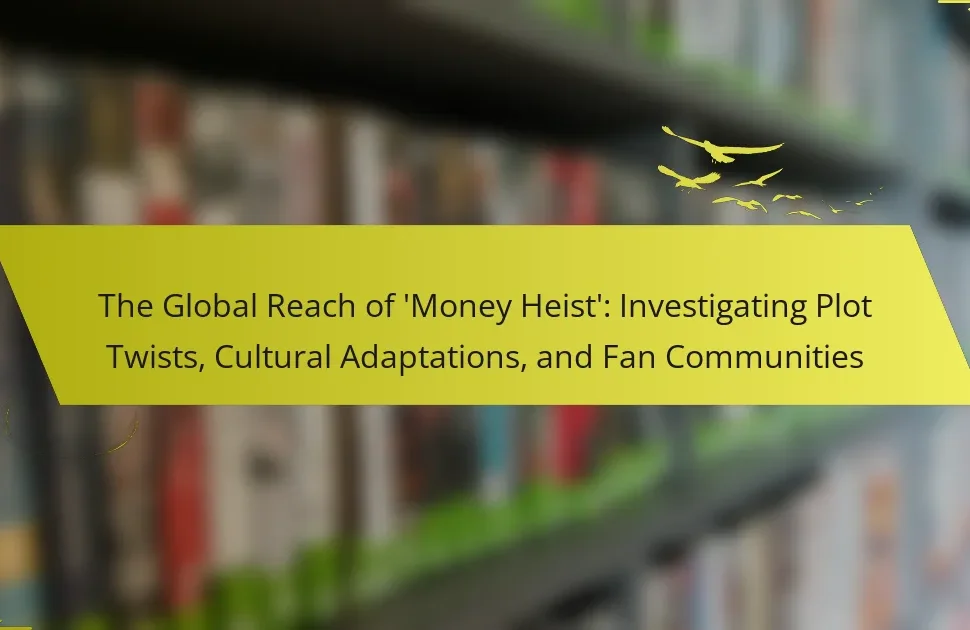The article examines the moral dilemmas presented in the television series ‘Breaking Bad’, focusing on the character arc of Walter White, who transitions from a law-abiding teacher to a drug manufacturer. It explores the conflict between legality and morality, highlighting how Walter’s justifications for his illegal actions impact his ethical boundaries and the lives of others. Viewer reactions play a crucial role in shaping perceptions of these moral dilemmas, revealing how emotional engagement influences judgments of character morality. The article discusses key themes such as the consequences of choices, the interplay between morality and legality, and the ripple effect of actions on interconnected lives, encouraging reflection on personal moral decisions.
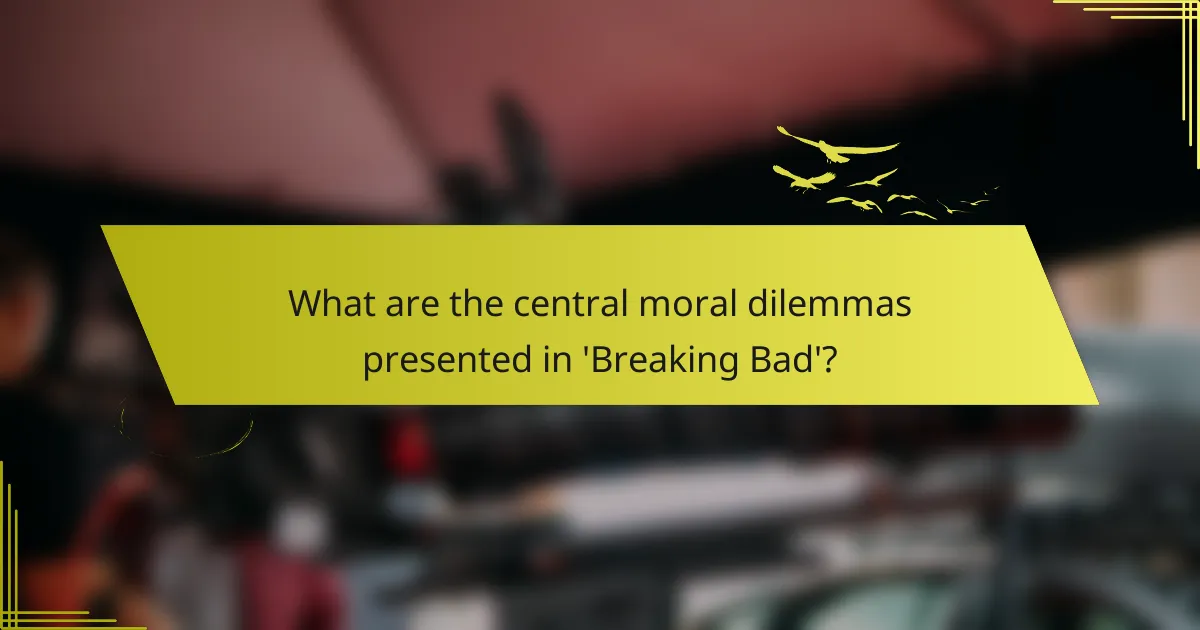
What are the central moral dilemmas presented in ‘Breaking Bad’?
The central moral dilemmas presented in ‘Breaking Bad’ include the conflict between legality and morality. Walter White’s transformation from a law-abiding citizen to a drug manufacturer raises questions about ethical boundaries. He justifies illegal actions for the sake of his family’s financial security. This creates a tension between personal ethics and societal laws. The series explores the consequences of choices made in desperation. Characters often face dilemmas that challenge their moral integrity. The impact of drug trade on innocent lives is also a significant concern. Ultimately, the show examines the complexities of human morality in extreme circumstances.
How do character arcs illustrate these moral dilemmas?
Character arcs in “Breaking Bad” illustrate moral dilemmas by showcasing the transformation of characters in response to ethical challenges. Walter White’s evolution from a law-abiding teacher to a drug kingpin exemplifies the conflict between personal ambition and moral integrity. His choices often force viewers to confront the consequences of his actions on family and society. Jesse Pinkman’s arc highlights the struggle between guilt and redemption, reflecting the impact of crime on personal identity. The series uses these arcs to provoke discussions about right and wrong, emphasizing the complexity of moral choices. Each character’s journey serves as a narrative device to explore themes of morality, consequence, and the human condition.
What transformations do key characters undergo throughout the series?
Key characters in “Breaking Bad” undergo significant moral and ethical transformations. Walter White evolves from a mild-mannered chemistry teacher to a ruthless drug lord. His initial motivation is to provide for his family after a cancer diagnosis. As the series progresses, his actions become increasingly self-serving and violent. Jesse Pinkman transitions from a small-time meth manufacturer to a deeply conflicted character seeking redemption. His experiences lead him to grapple with guilt and the consequences of his choices. Skyler White transforms from a supportive spouse to an active participant in Walter’s illegal activities. She struggles with her moral compass while trying to protect her family. Hank Schrader, initially a confident DEA agent, becomes increasingly disillusioned as he discovers the truth about Walter. These transformations highlight the series’ exploration of morality and the impact of choices on identity.
How do these transformations reflect ethical questions in the narrative?
The transformations of characters in ‘Breaking Bad’ reflect significant ethical questions in the narrative. Walter White’s evolution from a law-abiding teacher to a drug lord raises questions about morality and the consequences of choices. His actions challenge the viewer’s perception of right and wrong. The narrative explores themes of greed, power, and the impact of desperation. As Walter justifies his illegal activities for his family’s benefit, it prompts viewers to consider the ethics of his decisions. Jesse Pinkman’s journey also highlights the moral dilemmas faced by individuals in criminal environments. The contrast between Walter’s intentions and the resulting harm illustrates the complexity of ethical reasoning. This narrative structure encourages audiences to engage with profound ethical questions surrounding justice, loyalty, and personal responsibility.
What ethical questions arise from the actions of the main characters?
The actions of the main characters in “Breaking Bad” raise significant ethical questions. One primary question is whether the ends justify the means. Walter White’s transformation into a drug manufacturer challenges the morality of his decisions. His actions often harm others, leading to questions about personal responsibility. Another ethical concern involves the impact of his choices on family and community. The moral implications of deception and manipulation are also evident in the characters’ interactions. Additionally, the series prompts viewers to consider the consequences of crime and corruption. These ethical dilemmas reflect real-world issues related to legality and morality. Ultimately, the characters’ actions invite a deep exploration of right versus wrong.
How does Walter White’s journey challenge traditional notions of morality?
Walter White’s journey challenges traditional notions of morality by showcasing his transformation from a law-abiding citizen to a ruthless drug lord. Initially, Walter is portrayed as a sympathetic character, driven by the desire to provide for his family after a terminal cancer diagnosis. This motive complicates the moral landscape, as viewers empathize with his plight. As the series progresses, Walter’s actions become increasingly self-serving and violent. He manipulates others and engages in criminal activities, revealing a darker side that contradicts his initial justifications.
Walter’s descent into immorality raises questions about the nature of good and evil. His choices blur the lines between right and wrong, forcing viewers to reconsider their moral judgments. The series illustrates how desperation can lead to moral compromise, challenging the notion that individuals are inherently good or evil. Walter’s journey ultimately serves as a commentary on the complexity of human morality in extreme circumstances.
What ethical implications are associated with the drug trade depicted in the series?
The drug trade depicted in the series raises significant ethical implications. It showcases the consequences of illegal drug production and distribution. The actions of characters highlight issues of morality and legality. The series portrays the impact on families and communities affected by addiction. It also examines the conflict between personal gain and societal harm. The characters’ choices often reflect a struggle between right and wrong. This moral ambiguity prompts viewers to consider their own ethical beliefs. The series ultimately challenges the audience to reflect on the broader societal implications of the drug trade.
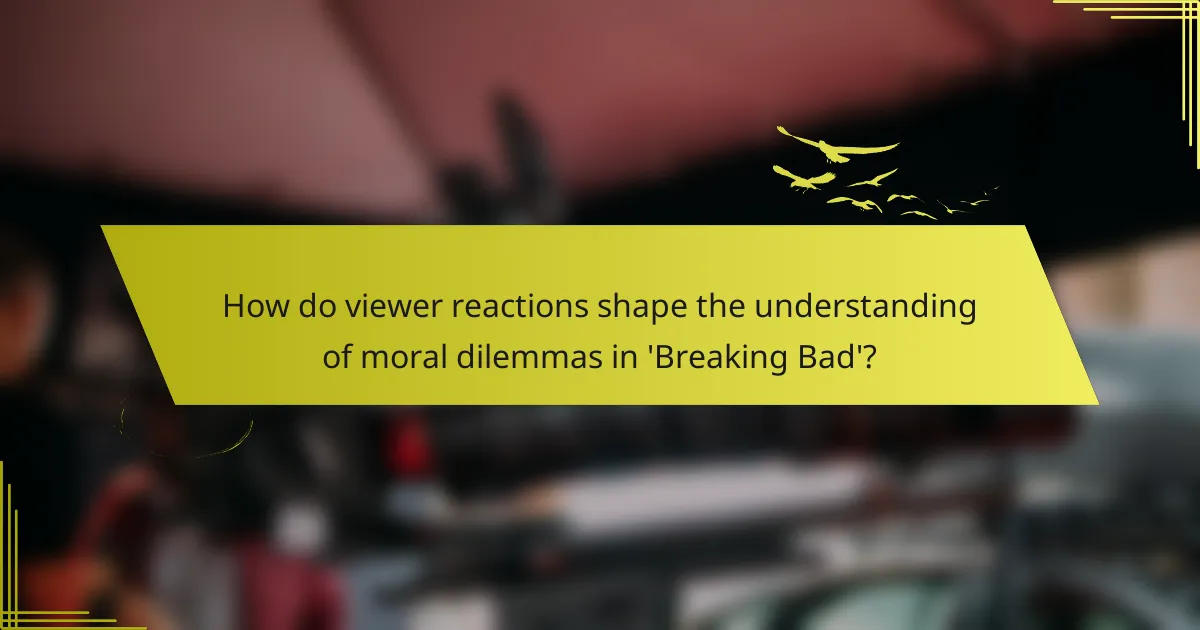
How do viewer reactions shape the understanding of moral dilemmas in ‘Breaking Bad’?
Viewer reactions significantly shape the understanding of moral dilemmas in ‘Breaking Bad’. These reactions provide insight into audience perceptions of characters and their choices. For instance, viewers often empathize with Walter White’s transformation from a teacher to a drug lord. This empathy complicates the moral landscape, as audiences may justify his actions based on his circumstances.
Research shows that emotional engagement influences moral reasoning. A study by Tamborini et al. (2013) highlights how viewers’ emotional responses can alter their judgments of character morality. In ‘Breaking Bad’, reactions to Walter’s choices reflect broader societal debates on morality and legality. This dynamic creates a dialogue between the narrative and audience interpretation, enhancing the complexity of moral dilemmas presented in the series.
What are common viewer interpretations of the characters’ moral choices?
Common viewer interpretations of the characters’ moral choices in “Breaking Bad” revolve around the complexities of good versus evil. Many viewers see Walter White’s transformation from a mild-mannered teacher to a drug kingpin as a critique of moral decay. This shift raises questions about the influence of desperation on ethical decision-making. Some viewers interpret Jesse Pinkman’s choices as reflective of his struggle for redemption amid a corrupt environment. Others argue that characters like Saul Goodman embody moral ambiguity, highlighting the gray areas in ethical dilemmas. The series invites audiences to grapple with the consequences of choices made for survival versus those made for ambition. Overall, interpretations vary, reflecting individual perspectives on morality and human behavior in extreme circumstances.
How do different audiences perceive Walter White’s descent into crime?
Different audiences perceive Walter White’s descent into crime through varied lenses of morality and empathy. Some viewers see his transformation as a tragic necessity driven by desperation. They argue that his initial motivation stems from a desire to provide for his family after a terminal cancer diagnosis. Others view his actions as a moral decline fueled by pride and ambition. This perspective emphasizes his willingness to embrace criminality for power and control. Additionally, some audience members experience a mix of admiration and revulsion. They acknowledge his intelligence and resourcefulness while condemning his ethical compromises. The complexity of Walter White’s character evokes diverse emotional responses, reflecting broader societal debates on morality and justice.
What role does audience empathy play in understanding character motivations?
Audience empathy is crucial in understanding character motivations. It allows viewers to connect emotionally with characters. This connection facilitates a deeper comprehension of their choices and actions. For instance, in “Breaking Bad,” Walter White’s transformation evokes empathy. Viewers often relate to his struggles and moral dilemmas. This emotional engagement helps explain his motivations for criminal behavior. Research indicates that empathy enhances narrative engagement. A study by transportation theory highlights how empathy influences viewer interpretations. Thus, audience empathy plays a significant role in interpreting character motivations effectively.
How do discussions and critiques of the series reflect societal values?
Discussions and critiques of “Breaking Bad” reflect societal values by highlighting moral complexities and ethical dilemmas. The series challenges viewers to consider the consequences of choices made by characters. It prompts conversations about legality versus morality, especially in relation to drug trade and crime. Critics often point out how Walter White’s transformation mirrors societal issues like desperation and ambition. The portrayal of family dynamics raises questions about loyalty and sacrifice. Additionally, viewer reactions reveal societal attitudes towards justice and redemption. Overall, the series serves as a lens through which audiences examine their own values and beliefs.
What insights can be gained from analyzing viewer forums and critiques?
Analyzing viewer forums and critiques provides insights into audience perceptions and interpretations. It reveals how viewers relate to character arcs and moral dilemmas. Discussions often highlight differing opinions on ethical questions presented in the show. Viewer critiques can indicate which themes resonate most with the audience. Patterns in feedback may show trends in viewer engagement over time. Quantitative analysis of forum posts can identify prevalent sentiments. This data can inform future storytelling in similar genres. Overall, viewer forums serve as a valuable resource for understanding audience dynamics and preferences.
How has ‘Breaking Bad’ influenced contemporary discussions on morality in media?
‘Breaking Bad’ has significantly influenced contemporary discussions on morality in media by presenting complex ethical dilemmas. The character arc of Walter White challenges traditional notions of good and evil. Viewers witness his transformation from a sympathetic character to a morally ambiguous figure. This shift prompts audiences to question their own moral judgments. The series encourages debates about the consequences of choices and the nature of morality. Critics have noted its impact on storytelling, emphasizing character complexity over clear moral binaries. Academic discussions often reference ‘Breaking Bad’ as a case study in moral ambiguity in modern television.
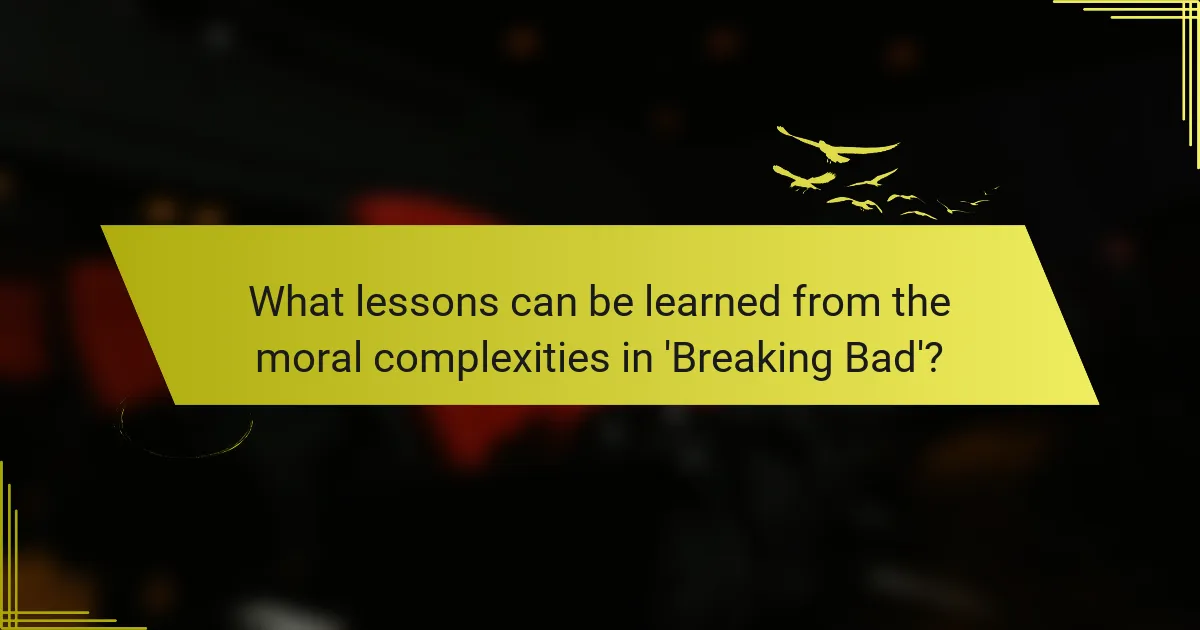
What lessons can be learned from the moral complexities in ‘Breaking Bad’?
The moral complexities in ‘Breaking Bad’ teach several important lessons. First, they highlight the consequences of choices. Walter White’s transformation from teacher to drug lord illustrates how ambition can corrupt. Second, the series explores the theme of morality versus legality. Characters often face ethical dilemmas that challenge their values. Third, it emphasizes the impact of environment on behavior. Walter’s descent is influenced by his circumstances and relationships. Lastly, it shows the ripple effect of actions. The repercussions of Walter’s decisions affect many lives, emphasizing interconnectedness. These lessons encourage viewers to reflect on their own moral choices and the potential consequences.
How can viewers apply the ethical questions raised in the series to real life?
Viewers can apply the ethical questions raised in “Breaking Bad” to real life by reflecting on their own moral choices. The series presents dilemmas about legality, morality, and personal responsibility. For instance, Walter White’s transformation raises questions about the justification of illegal actions for perceived greater good. Viewers can analyze their own decisions in light of these dilemmas.
They can consider the consequences of their actions on others. The show illustrates how small choices can lead to significant moral ramifications. By discussing these themes with others, viewers can foster a deeper understanding of ethics. Engaging in community dialogues about morality can help translate these lessons into everyday life.
Finally, viewers can evaluate their values and principles against the backdrop of the series’ complex characters. This self-reflection can lead to more informed and ethical decision-making in their own lives.
What practical insights can be drawn from the moral choices of characters?
Moral choices of characters in “Breaking Bad” reveal significant insights into human behavior and ethics. Characters like Walter White demonstrate how ambition can lead to ethical compromise. His transformation from a high school teacher to a drug lord illustrates the consequences of prioritizing personal gain over moral integrity.
The series shows that moral dilemmas often arise from complex circumstances. Characters face choices that reflect real-life ethical challenges. For instance, decisions made by Jesse Pinkman highlight the struggle between loyalty and self-preservation.
These moral choices prompt viewers to reflect on their values. They encourage discussions about right and wrong in ambiguous situations. The character arcs serve as cautionary tales about the slippery slope of moral decay.
Overall, the moral choices in “Breaking Bad” provide a lens through which to examine the impact of ethics on personal relationships and societal norms.
How can understanding these dilemmas enhance critical thinking skills?
Understanding moral dilemmas in “Breaking Bad” enhances critical thinking skills by prompting viewers to analyze complex ethical situations. Engaging with these dilemmas encourages individuals to evaluate multiple perspectives. This process fosters deeper reasoning and reflection on choices and consequences. Research indicates that analyzing moral conflicts improves decision-making abilities. A study by Greene et al. (2001) found that individuals who engage with moral dilemmas demonstrate enhanced cognitive flexibility. This flexibility allows for better problem-solving in real-life situations. Thus, understanding these dilemmas cultivates critical thinking by challenging assumptions and promoting nuanced understanding.
What best practices can be adopted for discussing moral dilemmas in media?
Adopting best practices for discussing moral dilemmas in media involves several key strategies. First, fostering an open dialogue encourages diverse perspectives. This approach allows for a richer understanding of the ethical complexities involved. Second, utilizing case studies from media, like ‘Breaking Bad’, provides concrete examples. Analyzing specific character decisions can illustrate moral conflicts effectively. Third, incorporating expert opinions from ethicists or psychologists adds credibility. Their insights can deepen the conversation around moral implications. Fourth, encouraging critical thinking helps audiences engage with the content meaningfully. This practice promotes reflection on personal values and societal norms. Lastly, creating a safe environment for discussion ensures participants feel comfortable sharing their views. This practice can lead to more fruitful and respectful exchanges.
The main entity of the article is “Breaking Bad,” a television series that explores significant moral dilemmas through its character arcs and ethical questions. The article examines the transformation of key characters, particularly Walter White, and the impact of their choices on personal and societal morality. It also discusses viewer reactions and interpretations, highlighting how empathy shapes understanding of character motivations and the broader implications of the drug trade depicted in the series. Additionally, the article emphasizes the importance of critical thinking and ethical reflections that arise from engaging with the show’s complex narratives.
